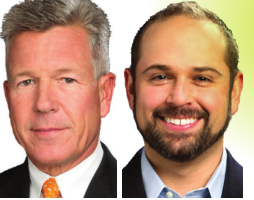Change is the only constant when it comes to our personal finances
We have discovered over the years that one of the more interesting aspects of our profession is how folks, often unintentionally, project their feelings, fears and anxieties onto us. Whether it’s on vacation or at community gatherings, we take our emotional magnet status in stride.
During times of economic turmoil, such as today, we are on the receiving end of variations on a theme of “aren’t these very stressful times for you and your clients?” Implicit in this query is the belief that stress is merely a prelude symptom of something worse (like panic) with a recession right around the corner.
Despite rumors to the contrary, financial advisors are not Olympian-type deities with superior powers of insight. We take advantage of being mortals by focusing on what we can control. We have found that merging hard work, cutting-edge analytics and technology, constant communication and plain common sense goes a long way to counteract the psychological and financial impact of fears and anxieties.
Yes, these are stressful times, and for good reasons we all know about. But stress is only an automatic gateway to panic if we let it be. Of course, our clients are modestly concerned, but our phones have not been ringing off the proverbial hook as many readers might presume.
Why? We work hard and spend an inordinate amount of time preparing for the unexpected and educating our clients accordingly. In fact, we prepare for the unexpected when the ride is smooth as it was in much of 2021. With our clients on board, we began adjusting accounts accordingly last year when many thought the economy was on an endless upswing (and as asset values became historically expensive).
Like it or not, change is the only constant when it comes to our social norms, the overall economy or our personal finances. One can repeat the mantra “ride with the good times and the bad times,” but if one is not prepared for either the smooth or bumpy ride, the words become hollow.
The media noise outside is relentless and challenges our best plans and intentions. We may or may not be in recession or a recession may or may not be around the corner. If you Google “prepare for a recession,” you will find pages of links to recent advice stories on how to prepare for a recession. There are many sound, fundamental constants that have roots back to Benjamin Franklin and his approach to personal finances:
•When in doubt, save some more.
• Create a budget (weekly, monthly, quarterly) and stick with it. Adjusting personal spending down rarely disappoints and, yes, can lead to more saving.
• Pay off debt.
• Stay away from knee-jerk reactions.
Time in the markets is infinitely more successful than timing the markets.
• History tells us that while no two recessions are the same, some far more destructive (2008-2009) than others (Covid 2020), they pass.
The historical perspective is important, especially for younger investors who are facing a turbulent economy for the first time. It takes discipline to take a deep breath and not toss your long-term plans and goals out the window. It is much easier if you have a durable plan in the first place.
What is fascinating from a psychological perspective is how, on a mass scale, the impact that public and media misconceptions can have on us. While it is true there are many negative forces at play (inflation, spiking energy prices, supply chain challenges, volatile markets, war in Ukraine), the cumulative effect of the media echo chamber about the economy can create its own reality, and often ignores how resilient economies can be.
In a recent interview with Bloomberg News, economist Mark Zandi said, “I talk to CEOs, CFOs, investors, friends, family — to the person, they think we’re going into recession. I’ve never seen anything like it. I’ve seen a lot of business cycles now. And no one predicts recessions. But in this one, everyone is predicting a recession.”
We are not in the business of predicting recessions. We are here to help our clients ride unpredictable economic waves by preparing for them one day at a time.
Tom Sedoric is partner, executive managing director and wealth manager, and D. Casey Snyder is partner, senior vice president and wealth manager of The Sedoric Group of Steward Partners in Portsmouth. They can be reached at thesedoricgroup.com.